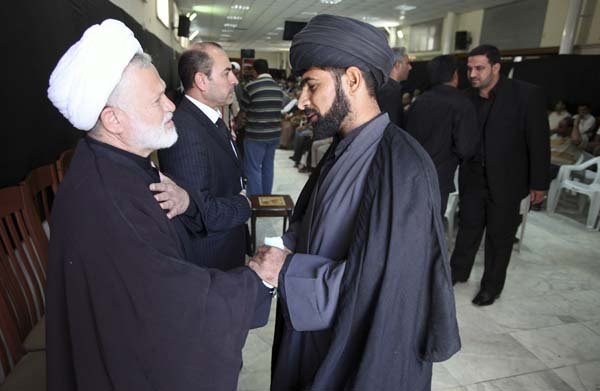TEHRAN, Iran — Thousands of Iranians prayed and wept Thursday during a memorial for Iraqi Shiite Muslim leader Abdul-Aziz al-Hakim, the start of a two-day tour of mourning that will take his body through his country's Shiite heartland, apparently in hopes of rallying large crowds of supporters.
Meanwhile, a string of car bombs exploded in Baghdad on Thursday as Iraqi forces tightened security around Shiite mosques, shrines and political party offices ahead of al-Hakim's funeral.
The car bombs targeted primarily Iraqi troops in the city and a northern Baghdad suburb, killing one and wounding 22 people, police officials said. The violence cast doubt on whether Iraqi forces can provide adequate security when thousands converge to mourn al-Hakim's death.
Islamic tradition calls for the dead be buried swiftly, preferably within hours of their deaths.
But in the case of al-Hakim - one of Iraq's most influential power brokers, who died Wednesday of lung cancer - there may be political considerations.
Iraq is holding parliament elections in January, and there will be stiff competition for the Shiite vote because of a split among Shiite parties. In regional elections this year, the party al-Hakim helped found, the Supreme Islamic Iraqi Council, did poorly in many parts of the south, so a show of masses of supporters turning out to mourn al-Hakim could boost the party.
After Thursday's ceremony in Tehran, al-Hakim's body was driven to the Shiite shrine city of Qom, south of the Iranian capital, for another memorial. From there he was to be flown to Baghdad to be taken to the holy city of Najaf, perhaps with a stop in at least one other Shiite city.
The memorials in Iran reflected al-Hakim's deep ties to the country, where he spent 20 years in exile leading a guerrilla force fighting Saddam Hussein's rule.
After Saddam's fall in 2003, he returned to his homeland to become leader of Iraq's biggest Shiite party and a symbol of the resurgence of Iraq's Shiite majority.
But many in Iraq - particularly Sunnis - were deeply suspicious of his close ties to Iran.
Thousands of Iranians and Iraqi expatriates marched in a procession carrying al-Hakim's coffin from the Iraqi Embassy in Tehran to a nearby mosque, as marching bands played. Iran's foreign minister as well as al-Hakim's son and political heir Ammar attended the ceremony.
Many women wept, and mourners held up photos of al-Hakim as well as of Iranian Supreme Leader Ayatollah Ali Khamenei.
"This is a big loss for Iraqi nation and government and a painful one for Iran," Khamenei said in a statement of condolences. "His services to his country in forming a national government before and after Saddam's fall are unique and unforgettable."
Iranian President Mahmoud Ahmadinejad called al-Hakim "a great scholar" who "spent the blessings-filled years of his life ... in the path of exalting Islam and fighting ignorance, dictatorship and brutality."
In Iraq, hundreds gathered near al-Hakim's office and his family home in Najaf, 100 miles south of Baghdad. Condolences were painted on black banners that hung from the main streets in Najaf, as hundreds more Shiites began arriving in the city in anticipation of al-Hakim's funeral.
Meanwhile, condolences for al-Hakim continued to pour in.
The top two U.S. officials in Iraq, Gen. Ray Odierno and Ambassador Christopher Hill, praised al-Hakim for "contributing to the building of a new Iraq" - a sign of how the cleric cannily balanced his ties between the United States and Iran, bitter rivals in the Mideast.
Iraqi Prime Minister Nouri al-Maliki said "his death at this sensitive stage that we are going through represents a big loss to Iraq."
The deadliest bombing in Iraq on Thursday struck at about 11 a.m. near a U.S. military base close to Taji, north of Baghdad, killing one and wounding six people, anIraqi police official said.
Hours earlier, three bombs attached to three parked cars exploded nearly simultaneously in Baghdad's primarily Sunni neighborhood of Azamiyah, wounding four police officers and two civilians, said another police official.
Two more bombings struck later in the day in different parts of the Iraqi capital, wounding 10, police said.
The U.S. military is closely watching the developments around al-Hakim's death, including how it could impact Iraq's political landscape.
"With or without al-Hakim's death, that is always the possibility as we move closer to the elections," said Brig. Gen. Stephen Lanza, a U.S. military spokesman. "There is political posturing that potentially could lead to violence."Information for this article was contributed by Chelsea Carter, Sameer N. Yacoub and Bushra Juhi of The Associated Press.
Front Section, Pages 7 on 08/28/2009
